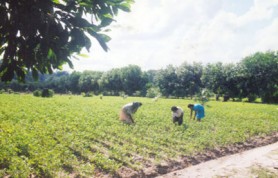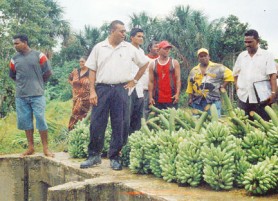Regional and international organisations responsible for development aid, the promotion of agriculture and disaster emergency management will partner with Caribbean public and private sector agencies, insurance companies, bankers and other stakeholders at a four-day symposium on agriculture insurance at the Jolly Beach Resort in Antigua from June 16 – 19.

Fashioning a regime of agricultural insurance tools to manage the risks associated with the sector is regarded as a major prerequisite to attracting significantly higher levels of private investment and Caricom has sought and secured the support of several specialized agencies that are strategically positioned to move this critical process forward. A brief on the symposium made available to Stabroek Business by the Caricom Secretariat in Georgetown lists the Food and Agricultural Organization (FAO), the Inter-American Agency for Cooperation in Agriculture (IICA), the Caribbean Agricultural Development Institute (CARDI), the Caribbean Disaster Emergency Management Agency (CDEMA), the Caribbean Development Bank (CDB), the European Union (EU) and African, Caribbean and Pacific Group (ACP) and the World Bank as partners at the four-day forum. Additional expertise and experiences drawn from the regional insurance sector have also been recruited to contribute to the Antigua deliberations.
At the symposium experts assessing the considerations underpinning a risk management strategy for agriculture in the region will examine various key issues including the current situation and outlook for agriculture disaster risk management. The state of agricultural financing in the region, private sector strategies in managing risks and the establishment of a regional programme for the management of risk in the agricultural sector will also be examined. Participants will also benefit from studies that examine the experiences of small farmer insurance in the region as well as similar larger extra-regional agricultural insurance schemes.
Guyana has been at the centre of recent regional discourses on the enhancement of agricultural production in order to both reduce the Caribbean’s food import bill and to position the sector to deal with a widely predicted food crisis linked to global population increase during the first half of the twenty-first century. Local and regional deliberations on significantly increasing food production through the introduction of private sector-driven mega farms have triggered debate over investor risks associated with a sector that remains vulnerable to the vagaries of unpredictable weather patterns and attendant limited protection against flooding and pest and other considerations that precipitate crop failure.

Numbered among the of objectives of the Antigua forum listed in the Caricom Secretariat brief is the strengthening of “the capacity of policy makers and technicians, development bankers, private insurance technicians and producers in the planning, innovation, development and management of a sustainable agricultural scheme for the Caribbean region.” The forum, the brief says, will also evaluate the policy, legislative and other challenges associated with the fashioning of a risk insurance policy for the regional agricultural sector.
Risk mitigation measures traditionally associated with the region’s agricultural sector have included the use of savings, accessing loans, crop diversification, use of drought-resistant, low-yielding species and state-funded mitigation efforts in the face of the disasters.
These measures, given the envisaged significant increase in the levels of investment in agriculture in the region, have come to be regarded as “significantly inadequate”. The Caricom Secretariat brief points to “the enormous administrative costs” associated with state-funded mitigation measures. “Long periods of waiting and, very often, inefficiency in execution frequently results in significant loss of confidence and motivation by the agricultural community.”
While issues of disaster risk management including crop insurance have surfaced in recent regional discourses on the expansion of the agricultural sector through private investment, the staging of a forum of the magnitude of the envisaged Antigua deliberations appears to mark a growing regional awareness of the heightened vulnerability of the Caribbean to volatile weather patterns associated with climate change.
Additionally, the impact of the global financial and economic crisis on regional economies have compelled Caricom to seriously contemplate the need to take advantage of the role that agriculture can play in helping to restore the region’s economic fortunes.
The region is also seeking to respond to greater private sector interest in investment in agriculture, arising out of the advances in information and communication technology that reduce the risks and challenges associated with production and management.
More aggressive investment in agriculture in the region is also seen as a mechanism for providing employment, reducing poverty and improving the incomes of rural communities in the Caribbean.
While the primary focus of the forum is on addressing insurance as a risk management tool in the agricultural sector, the Antigua symposium, the Caricom Secretariat brief says, has identified as one of its hoped-for outcomes the adoption of technologies and practices designed to reduce disaster risks in the agricultural sector.





